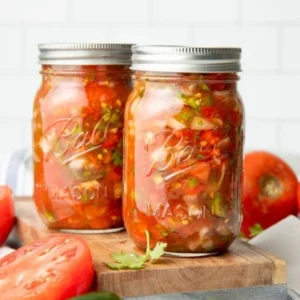Creme fraiche (pronounced krem fresh) is a cultured cream originating from France, known for its rich, velvety texture and mildly tangy flavor. It’s a staple in French cuisine and has made its way into kitchens around the world thanks to its versatility and luxurious taste. Unlike sour cream, creme fraiche has a higher fat content and doesn’t curdle when heated, making it a favorite for both savory dishes and desserts.
Whether you’re making a creamy pasta sauce or dolloping it onto fresh berries, creme fraiche adds depth and elegance to any meal.
Ingredients
Basic Ingredients:
-
1 cup (240 ml) heavy cream (not ultra-pasteurized)
-
2 tablespoons buttermilk (active cultures required)
Substitutions:



-
Use full-fat Greek yogurt (1 tbsp) instead of buttermilk if needed
-
Lactose-free heavy cream can work, but results may vary in texture
-
For a vegan option: use coconut cream + probiotic capsules (noted in variations)
Step-by-Step Cooking Instructions
-
Combine the Ingredients
-
In a clean glass jar or bowl, mix 1 cup of heavy cream with 2 tablespoons of buttermilk. Stir gently until fully blended.
-
-
Cover and Let it Sit
-
Loosely cover the container with a clean kitchen towel or cheesecloth. Let it sit at room temperature (around 70°F / 21°C) for 12 to 24 hours.
-
-
Check for Consistency
-
The cream should thicken and develop a tangy aroma. If it’s still runny, let it sit a few more hours.
-
-
Refrigerate
-
Once thickened, stir gently and refrigerate. It will continue to thicken as it chills. Store in a sealed container for up to 10 days.
-
Common Mistakes to Avoid:
-
Don’t use ultra-pasteurized cream—it may not culture properly.
-
Avoid metal containers, which can affect the culturing process.
-
Don’t refrigerate before it thickens at room temperature.
Pro Tips and Cooking Techniques
-
Use a thermometer to ensure your kitchen stays within the ideal culturing range (70°F / 21°C).
-
Sterilize your jar with boiling water to prevent bad bacteria.
-
For a smoother texture, strain the finished creme fraiche through cheesecloth for a few hours.
Variations and Customizations
-
Vegan Version: Mix 1 cup of coconut cream with 1 probiotic capsule. Let it sit for 24–36 hours.
-
Flavored Creme Fraiche: Add lemon zest, garlic, or herbs like chives for a savory twist.
-
Regional Touches: Add a bit of horseradish for Eastern European flair or pair with Mexican dishes as a sour cream substitute.
Serving Suggestions
-
Serve with smoked salmon on toast for a classic appetizer
-
Use as a sauce base for pasta, especially mushroom or truffle dishes
-
Dollop onto fruit desserts, pancakes, or warm pies
-
Pair with sparkling wine or crisp white wines to balance the richness
Nutritional Information (per tablespoon)
-
Calories: 55
-
Fat: 6g
-
Carbs: <1g
-
Protein: <1g
-
Calcium: 2% DV
(Based on heavy cream + buttermilk version)
Frequently Asked Questions (FAQs)
Q: Can I use ultra-pasteurized cream?
A: No, it usually won’t culture properly. Use pasteurized or raw cream.
Q: How long does creme fraiche last?
A: Up to 10 days in the fridge. If it smells off or develops mold, discard it.
Q: Can I freeze creme fraiche?
A: Freezing is not recommended—it may separate and lose texture.
Q: Is creme fraiche the same as sour cream?
A: No—sour cream is more tangy and has less fat. Creme fraiche is richer and more heat-stable.
Closing Thoughts
Creme fraiche is one of those simple joys of cooking that elevates almost anything it touches. Whether you’re dipping, dolloping, or stirring it into a dish, it brings a touch of French elegance to the table. Give this easy recipe a try—you might just ditch store-bought sour cream forever.



